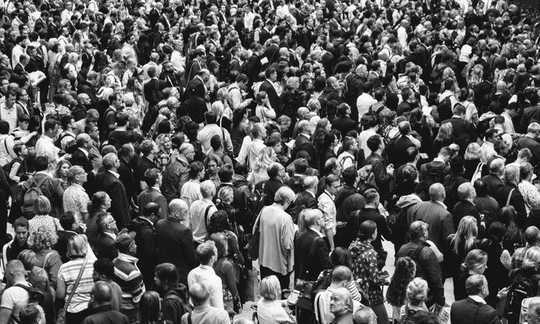Facebook의 활성 사용자 (이전 달에 사이트에 로그온 한 사용자)의 수는 2.45 억. 일부 맥락에서이를 위해 전 세계 인구의 약 32 %가 이제 소셜 미디어 플랫폼을 사용하고 있으며 참여 추세는 여전히 증가하고 있습니다.
With the exception of Google, there has never been a company that has had this many people using its services. In this context, it may seem strange to talk about those who are choosing to leave Facebook. But those who are leaving the platform represent a small, but by no means insignificant, counter current. And many people, perhaps looking to eke back some time from busy lives, are choosing to quit social media as a new year’s resolution.
2018의에 미국 조사 설문에 응한 사람들 중 9 %가 최근 Facebook 계정을 삭제했으며 35 %는 소셜 미디어 플랫폼을 덜 사용하고 있다고 응답했습니다. 경제적 인 성공과 인기에도 불구하고, Facebook의 원래 심장부에서 무언가 일어나고있는 것 같습니다.
내 건물 이전 작품 on 행동 영향, 나는 "Facebook deleters"라고 불리는 이들에 대한 그들의 동기와 세계에서 가장 강력한 소셜 네트워크를 떠나는 선택의 의미를 더 잘 이해하려고 노력했습니다.
동기 부여
In conversations I’ve had with those who have deleted Facebook, it has become evident that people’s motivations for leaving the platform are varied and complex.
내 가정은 Snowden 누출과 같은 주요 사건, 케임브리지 분석가 Mark Zuckerberg의 추문 및 계시 비밀 회의 도널드 트럼프 미국 대통령과 함께 페이스 북 계정을 삭제하는 주요 동기가되었습니다. 그러나 제가 페이스 북을 지우는 사람들은 네트워크를 떠나는 주요 동기 인 정치적 프라이버시 나 데이터 프라이버시에 대한 우려를 거의 제기하지 않습니다.
Indeed, when our conversation turns to the Cambridge Analytica scandal, many suggest that this had only confirmed what they had always assumed about how their personal data was being exploited (at least one person had never even heard of Cambridge Analytica).
Many of those who delete Facebook speak of widely recognised reasons for leaving the platform: concerns with its echo chamber effects, avoiding time wasting and procrastination, and the negative psychological effects of perpetual social comparison. But other explanations seem to relate more to what Facebook is becoming and how this evolving technology intersects with personal experiences.
While many people find it difficult to articulate precisely why they joined Facebook (being intrigued or attracted by the site’s novelty, it seems), it is clear that for many the platform has started to play a very different role in their lives. The notion of “oversharing” is discussed as an aspect of what Facebook has turned into, as users find their feeds clogged with information they find gratuitously personal and irrelevant.
디지털 원주민
어릴 적 페이스 북에 가입 한 사람들은 소셜 네트워크가 너무 커지는 경향이 있습니다. 소셜 미디어 네트워크의 크기는 유용하고 신뢰할 수있는 사람들이 찾는 방법에 중요한 요소 인 것으로 보입니다. 우리는 150 명을 초과하는 사회 집단이 너무 커서 효과적으로 알고 유지하기에 너무 큰 경향이 있음을 알고 있습니다. 던바 번호인류 학자 Robin Dunbar의 이름을 따서 지어졌습니다. Facebook의 맥락에서 수천 명의 사람들로 구성된 네트워크를 가진 사람들은 (엄격한 개인 정보 보호 설정을 적용하더라도) 신뢰하기가 점점 어려워지고 있습니다.
A further problem for digital natives is the length of time they have been archiving their lives on Facebook. Their Facebook archive often goes back to a time when they were less selective in the curation of their online selves. Such careless sharing is now seen as a threat to the social image they are keen to establish in adulthood.
A recurring theme is the social commitment of being on Facebook. While Facebook enables people to stay connected with their friends, family and communities, it is also seen as generating a new form of digital domestic labour.
 소셜 네트워크에는 너무 많은 사람들이 있습니까? 롭 쿠란 / 스플래쉬, FAL
소셜 네트워크에는 너무 많은 사람들이 있습니까? 롭 쿠란 / 스플래쉬, FAL
One of the reasons for the success of social media, of course, is its ability to tap into our social instinct for knowledge sharing and exchange. But as social networks grow on Facebook, it appears that the costs of mutual obligation (they liked my post, so I had better like theirs) start to outweigh the benefits to being connected.
This is where digital forms of mutual obligation are different to real ones – in the real world we shake hands and say nice things to each other in the moment of encounter. But in the digital world social obligations can quickly accumulate to unsustainable levels.
시사점
Although Facebook may still continue to grow, those who leave the platform reveal interesting trends which hint at how future relationships with smart technology and social media will play out.
We are in an era of historically unprecedented opportunities for social connection and engagement. Those who leave Facebook are at one end of a spectrum we all inhabit as we try and work through questions of digital identity, responsibility and collective customs.
Leaving social networks is one of several options we can choose as we attempt to navigate this new world. But Facebook deletion is not just a process of people redefining their digital self. Deletion is also a response to a set of emerging tensions between an evolving technology and social life.
페이스 북의 경제 모델이 변화함에 따라 (규모, 강도 및 수익 창출 모두) 사회적 유용성과 바람직성에 대한 명확한 장벽에 직면 할 것으로 보입니다. 물론 이것은 Facebook 자체의 가치가 충돌하기 시작하는 곳입니다. 화해하려고한다 높은 수익 창출 모드로 세상을 연결하려는 욕구.
The small numbers of people who delete Facebook are not going to change Facebook’s economic model anytime soon. But the future may see the company testing the limits of engagement with social media platforms.![]()
저자에 관하여
인간 지리학 교수 Mark Whitehead, 애버리 스 위스 대학
이 기사는에서 다시 게시됩니다. 대화 크리에이티브 커먼즈 라이센스하에 읽기 원래 기사.

관련 도서 :
원자 습관 : 좋은 습관을 만들고 나쁜 습관을 깰 수있는 쉽고 입증 된 방법
제임스 클리어
Atomic Habits는 행동 변화에 대한 과학적 연구를 바탕으로 좋은 습관을 기르고 나쁜 습관을 없애기 위한 실용적인 조언을 제공합니다.
네 가지 경향: 당신의 삶을 더 좋게 만드는 방법을 알려주는 필수 성격 프로필
그레첸 루빈
네 가지 성향은 네 가지 성격 유형을 식별하고 자신의 성향을 이해하는 것이 관계, 업무 습관 및 전반적인 행복을 개선하는 데 어떻게 도움이 되는지 설명합니다.
다시 생각하십시오 : 모르는 것을 아는 힘
아담 그랜트
Think Again은 사람들이 어떻게 마음과 태도를 바꿀 수 있는지 탐구하고 비판적 사고와 의사 결정을 개선하기 위한 전략을 제공합니다.
신체가 점수를 유지합니다 : 트라우마 치유에있어 두뇌, 정신 및 신체
베셀 반 데르 콜크
The Body Keeps the Score는 트라우마와 신체 건강 사이의 연관성에 대해 논의하고 트라우마를 치료하고 치유할 수 있는 방법에 대한 통찰력을 제공합니다.
돈의 심리학: 부, 탐욕, 행복에 대한 시대를 초월한 교훈
모건 하젤
돈의 심리학은 돈에 대한 우리의 태도와 행동이 우리의 재정적 성공과 전반적인 행복을 형성할 수 있는 방법을 조사합니다.





















